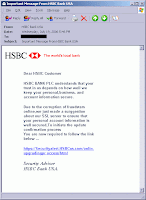 What is means by third party certification programme?? It means that who issue the digital certificate services. In Malaysia, the most famous application of third party certification programme is MSC Trustgate.com Sdn Bhd. MSC Trustgate.com Sdn Bhd was incorporated in 1999 and it is a licensed Certification Authority (CA) under the operation of the Multimedia Super Corridor.
What is means by third party certification programme?? It means that who issue the digital certificate services. In Malaysia, the most famous application of third party certification programme is MSC Trustgate.com Sdn Bhd. MSC Trustgate.com Sdn Bhd was incorporated in 1999 and it is a licensed Certification Authority (CA) under the operation of the Multimedia Super Corridor.  The Certification Authority offers complete security solution and leading the trust services that are needed by enterprises, government, individuals and e-commerce service providers using digital certificates, signatures, encryption and decryption. MSC Trustgate is secure to open network communication in both locally and across the ASEAN region and to become the catalyst for growth of e-commerce.
The Certification Authority offers complete security solution and leading the trust services that are needed by enterprises, government, individuals and e-commerce service providers using digital certificates, signatures, encryption and decryption. MSC Trustgate is secure to open network communication in both locally and across the ASEAN region and to become the catalyst for growth of e-commerce. The vision of Trustgate is “To enable organizations to conduct their business securely over the Internet, as much as what they have been enjoying in the physical world.”
Trustgate provide the product and services which are SSL Certificate, Managed PKL, Personal ID, MyTRUST, MyKAD ID, SSL VPN, Managed Security Services, VeriSign Certified Training and Application Development.
The MyTRUST for mobile phone is for secure mobile banking and other financial services. This service is ease and conveniences to users via their mobile phone to digital
 sign any transaction. The mobile digital signature is provides the non-repudiation on transactions. PKI-enabled SIM cards are preloaded with MyTRUST application and a digital certificate from a licensed CA.
sign any transaction. The mobile digital signature is provides the non-repudiation on transactions. PKI-enabled SIM cards are preloaded with MyTRUST application and a digital certificate from a licensed CA.MyKAD PKI (MyKey)
The Malaysian government has provided a smart National Identify Card “MyKad” to every citizen. MyKey is the MyKad PKI solution that works with physically MyKad. Malaysian government was accepted digitally sign documents or transactions through online. And MyKad with PKI capability allows holder to conduct online transaction with private sector and government agencies.
 The SSL Certificate service is to enhance the security of server. MSC Trustgate provide Global server ID and secure server ID be their server security.
The SSL Certificate service is to enhance the security of server. MSC Trustgate provide Global server ID and secure server ID be their server security. 















